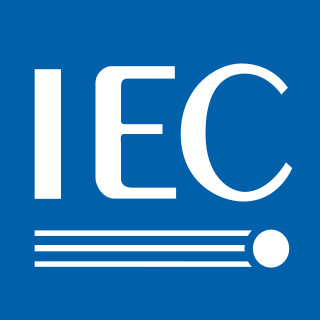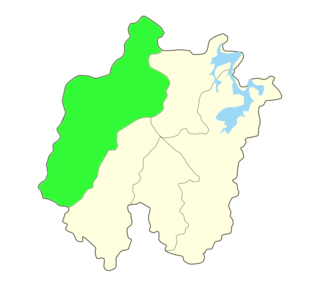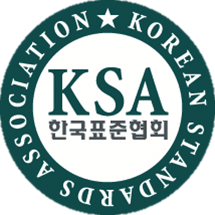
The International Organization for Standardization is an international standard development organization composed of representatives from the national standards organizations of member countries. Membership requirements are given in Article 3 of the ISO Statutes.

The International Electrotechnical Commission is an international standards organization that prepares and publishes international standards for all electrical, electronic and related technologies – collectively known as "electrotechnology". IEC standards cover a vast range of technologies from power generation, transmission and distribution to home appliances and office equipment, semiconductors, fibre optics, batteries, solar energy, nanotechnology and marine energy as well as many others. The IEC also manages four global conformity assessment systems that certify whether equipment, system or components conform to its international standards.
Standardization or standardisation is the process of implementing and developing technical standards based on the consensus of different parties that include firms, users, interest groups, standards organizations and governments. Standardization can help maximize compatibility, interoperability, safety, repeatability, or quality. It can also facilitate a normalization of formerly custom processes. In social sciences, including economics, the idea of standardization is close to the solution for a coordination problem, a situation in which all parties can realize mutual gains, but only by making mutually consistent decisions.
Standard temperature and pressure (STP) are standard sets of conditions for experimental measurements to be established to allow comparisons to be made between different sets of data. The most used standards are those of the International Union of Pure and Applied Chemistry (IUPAC) and the National Institute of Standards and Technology (NIST), although these are not universally accepted standards. Other organizations have established a variety of alternative definitions for their standard reference conditions.
A standards organization, standards body, standards developing organization (SDO), or standards setting organization (SSO) is an organization whose primary function is developing, coordinating, promulgating, revising, amending, reissuing, interpreting, or otherwise contributing to the usefulness of technical standards to those who employ them. Such an organization works to create uniformity across producers, consumers, government agencies, and other relevant parties regarding terminology, product specifications, protocols, and more. Its goals could include ensuring that Company A's external hard drive works on Company B's computer, an individual's blood pressure measures the same with Company C's sphygmomanometer as it does with Company D's, or that all shirts that should not be ironed have the same icon on the label.

Yuseong District (Yuseong-gu) is a gu ("district") of Daejeon, South Korea, known for high tech industries, Daejeon Expo '93, Daedeok Science Town and the Yuseong Special Tourism District. Daejeon Islamic Center is also located in Kung-dong, Yuseong-gu. The Science Town is the core of the International Science and Business Belt.
Daedeok Innopolis, formerly known as Daedeok Science Town, is the research and development district in the Yuseong-gu district in Daejeon, South Korea. The plan to concentrate research institutes and universities was made in 1967, and president Park Chunghee approved subsequent master planning in 1973. Now the district contains over 20 major research institutes and over 40 corporate research centers. There are 232 research and educational institutions to be found in Daejeon, many in the Daedeok region, among them the Electronics and Telecommunications Research Institute and the Korea Aerospace Research Institute. A number of IT venture companies have sprung up in this region thanks to the high concentration of Ph.Ds in the applied sciences. Korea has invested heavily in building up the research expertise for over 30 years, creating long-term research programs. Over 7,000 PhD researchers are in the sciences in Daedeok and it had the most application for patents during 2000–2011 among the National Industrial Complex.
Association Française de Normalisation is a Paris-based standards organization and a member body for France at the International Organization for Standardization (ISO).

KERIS is a governmental organization under the South Korean Ministry of Education, Science and Technology that develops, proposes, and advises on current and future government policies and initiatives regarding education in South Korea.
HLA is a time signal radio station in Daejeon, South Korea, operated by the Korea Research Institute of Standards and Science. Established on November 24, 1984, it transmits a 2 kW signal on 5 MHz (±0.01 Hz). Originally only transmitted for 7 hours per day (01:00–08:00), 5 days per week (M–F), it is continuous as of 2011. There are over 100 users of the signal in Korea.
ISO/IEC JTC 1/SC 36 Information Technology for Learning, Education and Training is a standardization subcommittee (SC), which is part of the Joint Technical Committee ISO/IEC JTC 1 of the International Organization for Standardization (ISO) and the International Electrotechnical Commission (IEC), that develops and facilitates standards within the field of information technology (IT) for learning, education and training (LET). ISO/IEC JTC 1/SC 36 was established at the November 1999 ISO/IEC JTC 1 plenary in Seoul, Korea. The subcommittee held its first plenary meeting in March 2000 in London, United Kingdom. The international secretariat of ISO/IEC JTC 1/SC 36 is the Korean Agency for Technology and Standards (KATS), located in the Republic of Korea.
The National Standardization Agency of Indonesia is the International Organization for Standardization (ISO) member body for Indonesia. BSN is a non-ministerial Indonesian government agency with the main task of carrying out governmental tasks in the field of standardization and conformity assessment in Indonesia.
Note: This special working group has been disbanded. The work begun in ISO/IEC/JTC 1/SWG 5 on Internet of Things standardization gaps will be continued in ISO/IEC JTC 1/WG 10.
ISO/IEC JTC 1/SC 6 Telecommunications and information exchange between systems is a standardization subcommittee of the Joint Technical Committee ISO/IEC JTC 1. It is part of the International Organization for Standardization (ISO) and the International Electrotechnical Commission (IEC), which develops and facilitates standards within the field of telecommunications and information exchange between systems.
Note: This working group has been disbanded.

KSA, formerly known as Korean Standards Association, is a public organization under South Korea's Ministry of Trade, Industry and Energy (MOTIE). KSA was established in 1962 pursuant to Article 32 of the Industrial Standardization Act. The Chairman and CEO is Lee Sang-jin, and at the end of the fiscal year 2017, sales were KRW 99.6 billion.
Korean units of measurement, called cheokgwan-beop or cheokgeun-beop in Korean, is the traditional system of measurement used by the people of the Korean peninsula. It is largely based on the Chinese system, with influence from Japanese standards imposed following its annexation of the Korean Empire in 1910. Both North and South Korea currently employ the metric system. Since 2007, South Korea has criminalized the use of Korean units in commercial contexts but informal use continues, especially of the pyeong as a measure of residential and commercial floorspace. North Korea continues to use the traditional units, although their standards are now derived from metric conversions.
The National Quality Management Commission, formerly the State Administration of Quality Management of the Democratic People's Republic of Korea (SAQM) is the North Korean standards organization. It oversees standards and metrology, including application of both the metric system and traditional Korean units, in accordance with the 1993 Law on Metrology. It is located at 1 Inhung-Dong in Moranbong District, Pyongyang.




